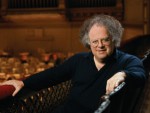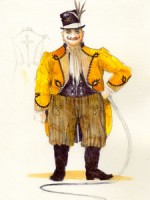Title
The highly anticipated first production between Juilliard and the Metropolitan Opera takes place this month with three performances of Bedrich Smetana’s well-loved comic opera The Bartered Bride. Along with a stellar team of artists including conductor James Levine, director Stephen Wadsworth, and choreographer Benjamin Millepied, the production showcases some of today’s most promising young opera singers, with a cast comprising current members and graduates of both the Met’s Lindemann Young Artist Development Program and Juilliard’s Ellen and James S. Marcus Institute for Vocal Arts. The opera will be performed in English utilizing a new translation of the libretto by J.D. McClatchey, commissioned by the Met. It was last performed at Juilliard in 2005, with Eve Shapiro directing and Mark Stringer conducting.
Maestro James Levine will conduct Smetana’s The Bartered Bride, the first Juilliard-Metropolitan Opera joint production.
(Photo by Jörg Meyer)Body
Smetana composed The Bartered Bride between 1863 and 1866 and revised it several times prior to the three-act final version of 1870. It was premiered at the Provisional Theater in Prague on May 30, 1866, with Smetana conducting. While not immediately well-received, the opera gained worldwide popularity after the landmark performance given by the Prague National Theater at the Vienna Music and Theater Exhibition in 1892. By this time, Smetana had made numerous revisions of the original version, including such major changes as inserting dances and replacing spoken dialogue with recitative. The Bartered Bride (Prodana Nevesta in Czech) had its Met premiere in 1909, and was given a new production by John Dexter in 1978 with Levine conducting. The work’s most recent Met performance was in 1996, again with Maestro Levine, who has called it “one of the greatest opera scores ever written” and “always a pleasure for everyone.”
The libretto, by Karel Sabina, is typical comic opera fare, with the events unfolding on an unspecified festival day in a Bohemian village. Act I introduces the young couple Jenik (sung by Juilliard alum Paul Appleby) and Marenka (Layla Claire). They hope to marry, but Marenka’s father has already promised her to Vasek (Alexander Lewis), the son of the landowner Micha (Juilliard student Alexander Hajek), as repayment for a debt. Kecal (Jordan Bisch), the scheming marriage broker, assures Marenka’s parents, Ludmilla (Jennifer Johnson) and Krusina (Donovan Singletary), that he can convince her to honor the contract. After hearing Kecal proclaim Vasek’s merits, however, Marenka remains unconvinced.
In Act II, a disguised Marenka convinces the already nervous Vasek to renounce his intended bride, while Kecal tries to bribe Jenik to renounce her. Surprisingly, Jenik agrees, but only on the conditions that Marenka may only marry “the son of Micha” and that all of Krusina’s debts to Micha be forgiven. In Act III, Marenka is infuriated to discover she has been “bartered” (for a second time, no less) and to spite Jenik decides to marry the now-willing Vasek. As the villagers gather, Jenik comes forward to reveal himself as the long-lost son from Micha’s first marriage and asks Marenka to pick her groom. She chooses him and the villagers rejoice as the lovers happily reunite. (The cast also includes, among others, Juilliard student Noah Baetge as the Ringmaster and alumna Renee Tatum as Hata.)
In 1857, Smetana spoke at a gathering of musicians in Weimar about his desire to create a modern type of comic opera as a response to Wagner. He was also reportedly spurred on by a remark from Johann von Herbeck, a Viennese conductor, that Czechs were excellent performers but seemingly unable to create any music that was distinctly their own. Smetana later commented that “That evening was decisive for my whole life; I swore there and then that no other than I should beget a native Czech music.” Smetana fulfilled his vow so admirably that he ultimately became known as the “father of Czech music.”
Nowhere is this effort more evident than in The Bartered Bride. As director Stephen Wadsworth explained in a recent e-mail message: “The Bartered Bride, though hardly political in content, was a deeply political venture: For Smetana and his librettist, Karel Sabina, the issue of Czechoslovak self-determination had been hugely important for many years before they wrote Bride. Czechoslovakia had struggled for centuries to protect its cultural identity and even its languages from the Hapsburg court in Vienna, which tried, in effect, to colonize and erase it. While Smetana was composing, the Austro-Hungarian alliance was formed, and although there was greater Czech and Slovak representation in both governments than there had been in the Hapsburg court, the struggle continued. At this moment Smetana and Sabina presented a story, full of absolutely Czech folk and dance music, of two young people struggling with two sets of controlling parents: Marenka and Jenik could be the Czechs and the Slovaks, their parents the Austrians and the Hungarians. Marenka and Jenik are bent on self-determination and fight heroically for it. In this sense Bride is a 100 percent political act.”
In his article on Smetana for the Grove Dictionary of Music and Musicians, John Tyrell observed that the libretto was one of the few of its time “to be written mostly in trochees or even prose (rather than high-style iambs), thus matching the natural first-syllable stress of Czech.” Tyrell also pointed to the simplicity of the music and closeness of individual numbers to Czech dance genres, including the polka, the furiant, and the skocna, a virtuosic Bohemian folk dance in duple meter.
Historically, dancing has played a major role in the opera. As Timothy Cheek wrote in his performance guide to The Bartered Bride, the dances are “vital to the communal spirit and the national flavor of the opera, and because they are so well known in the concert hall, the dances simply cannot be cut. The opera, then, has served as a showcase for choreographers and dancers almost as much as singers.” This production follows in that tradition with dance sequences by Benjamin Millepied, a leading dancer with the New York City Ballet and a highly acclaimed choreographer. (Millepied has recently been a hot news item for his work on the film Black Swan and the fact that he and actress Natalie Portman, who stars in the movie, are engaged and expecting their first child.) Students from Juilliard Dance will perform in the February production.
Of course, The Bartered Bride has many merits that go beyond its success in expressing a nationalistic spirit. The famous overture, a staple on orchestral concert programs, establishes the exuberant mood and freshness that give the opera much of its charm from the outset. Smetana’s skill in using music to effectively illustrate his characters’ personality traits is also of note, and may be one indication of his debt to Mozart, whose light operas Smetana cited as models for this work.
“It’s a very affecting human comedy,” Wadsworth said. “The urgent political energy that fueled its creation is one reason that the stakes feel so high. I think it’s a masterpiece.






